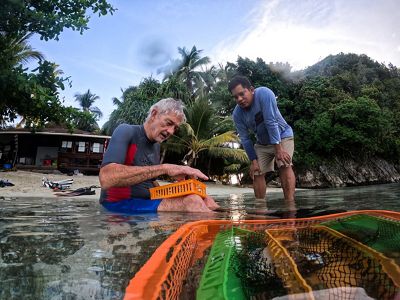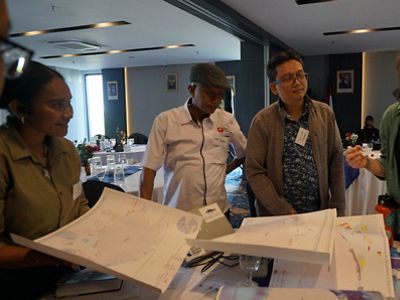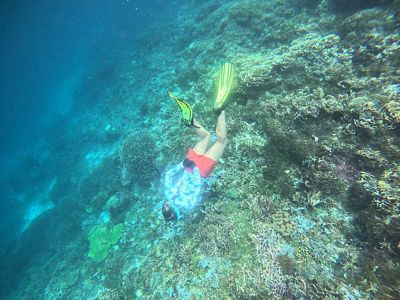Coral Reef Conservation Efforts: YKAN and Partners Research Coral Resilience Amid Climate Crisis
Media Contacts
-
Adia Puja Pradana
Communications Specialist Ocean Program YKAN
Yayasan Konservasi Alam Nusantara
Email: adia.pradana@ykan.or.id
Sorong, Southwest Papua, March 7, 2025 - Yayasan Konservasi Alam Nusantara (YKAN), together with The Nature Conservancy (TNC), Reef Resilience Network, and Stanford University, organized a workshop entitled "Restoration Planning with Thermal Data Workshop" on March 3-5, 2025 in Sorong and Dampier Strait, Raja Ampat Regency, Southwest Papua Province.
The workshop aims to strengthen coral reef conservation efforts in Indonesia by integrating thermal tolerance data into restoration planning while supporting the resilience of marine ecosystems to climate change.

This activity is a continuation of the "Coral Reef Resilience to Climate Change" project initiated by YKAN and partners in Raja Ampat which was implemented at the end of 2024. The project focused on identifying coral reefs resilient to rising sea temperatures to support Marine Protected Areas (MPAs) management and zoning systems.
Therefore, YKAN and its partners continue to support a team of national and international researchers in researching the resilience of coral reefs to climate change in order to prioritize protection for MPAs in Raja Ampat.
"Coral reef ecosystems are vital because they serve as a buffer against the impacts of climate change, support marine life, and provide important marine ecosystem services. However, Indonesia's current Marine Spatial Planning framework does not adequately accommodate climate resilient coral reef aspects due to knowledge gaps regarding climate resilient coral reef species and locations," said the Head of the Raja Ampat KKP Regional Public Service Agency (BLUD), Syafri Tuharea.
The workshop brought together key stakeholders, including representatives from the Sorong Coastal and Marine Resources Management Workshop (PKSPL) - Ministry of Marine Affairs and Fisheries (MMAF), the National Research and Innovation Agency (BRIN - Center for Research on Marine Resources Conservation and Inland Waters), the Department of Agriculture, Food, Marine and Fisheries (P2KP) of Southwest Papua, Southwest Papua Regional Research and Innovation Agency (Bapperida), Raja Ampat Research and Conservation Center (RARCC), UPTD BLUD KKP Raja Ampat, Misool Foundation, and academics from several universities such as the University of Papua (UNIPA) and Muhammadiyah University of Sorong (UNAMIN) to address these gaps. Over three days, participants gained basic knowledge of restoration planning, coral thermal tolerance data guidelines, and technical advice based on case studies in South Misool.

The first and second days of the workshop focused on developing restoration plans and processing thermal data. In contrast, the third day included field trips to Cape Kri and Sawandarek to see the impacts of coral bleaching and the recovery process and discuss challenges and solutions.
"This activity aligns with YKAN's commitment to protect Indonesia's marine biodiversity, support sustainable fisheries, and balance human needs with natural sustainability. This workshop is expected to strengthen Indonesia's Marine Spatial Planning through cross-sector collaboration and serve as a model for future science-based conservation efforts," said YKAN's Bird's Head Seascape Senior Manager Awaludinnoer.
Coral Reef Resilience for Marine Conservation Strategies
Integrating climate resilience into the MPA zoning system in Raja Ampat is one strategy to improve the protection and conservation of coral reefs and their associated biota. To this end, YKAN and partners have analyzed data on corals, reef fish, marine hydrodynamics, reef use, and sources of threats, as well as access to identify key locations resilient to climate change.

Several researchers have determined the most suitable locations in Raja Ampat waters to conduct this research, both in South Misool and North Misool. In November 2024, Stephen Palumbi, a professor and marine biologist from Stanford University, trained key stakeholders in the Raja Ampat MPA area on conducting thermal tests to assess coral reef resilience and understand how coral reefs may adapt to rising ocean temperatures. This is essential for improving conservation strategies to protect marine biodiversity in the face of climate change.
The results of a recent South Misool study conducted from November 2024 to January 2025 are a significant highlight. Thermal test experiments were conducted at Kalig Station, Salabafunuatsa, and Yuf Island on eight coral species, namely Acropora hyacinthus, Acropora formosa, Acropora humilis, Pocillopora verrucosa, Porites lobata, Porites cylindrica, Stylophora pistillata and Seriatopora hystrix.
"This experiment used 16 healthy adult coral fragments per species, collected from shallow waters with depths between 1 and 5 meters. This research method used two seawater media, namely control and heated media, with the tested temperature being 34oC-37oC," explained Senior Manager of YKAN Marine Protection Yusuf Fajariyanto.
The results showed that the Porites lobata and Porites cylindrical species showed better temperature resistance than other species. Other results stated that several types of coral at Kalig Station showed lower temperature resistance than coral species at Salabafunuatsa. Acropora hyacinthus, Acropora formosa, and Pocillopora verrucosa showed better temperature resistance at Salabafunuatsa, while Acropora humilis, Seriatopora hystrix, and Stylophora pistillata showed better temperature resistance at Kalig Station.

"This research will continue throughout 2025 by conducting experiments in several locations. Later, this data is expected to be the basis for formulating a more resilient coral reef conservation strategy that can be replicated in other waters in Indonesia," concluded Yusuf.
What Yusuf said was reinforced by the coral bleaching researcher at the Research Center for Marine and Inland Water Resources Conservation of BRIN, Rita Rachmawati. According to her, the implementation of coral reef ecosystem rehabilitation using coral that has the potential to be more resistant to rising sea temperatures can increase the success of repairing damaged coral reef ecosystems in the long term because of its ability to survive during mass coral bleaching.
"Coral resilience to rising sea temperatures can potentially be increased with certain 'training' for coral that was previously susceptible to coral bleaching, which in the future can be the next experimental agenda to be implemented, thus increasing the success rate of coral reef ecosystem rehabilitation," explained Rita.
Yayasan Konservasi Alam Nusantara (YKAN) is a scientific-based non-profit organization that has been present in Indonesia since 2014. With the mission of protecting lands and waters as life support systems, we provide innovative solutions to realize the harmony of nature and humans through effective natural resource management, prioritizing a non-confrontational approach, and building a network of partnerships with all stakeholders for a sustainable Indonesia. For more information, visit ykan.or.id.


